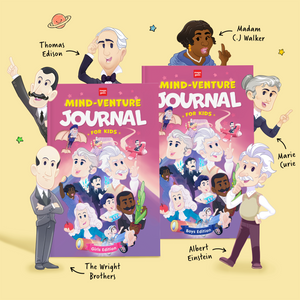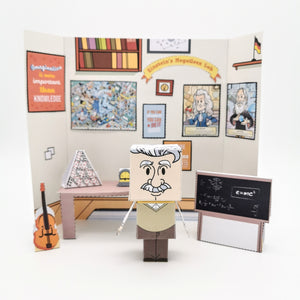The Interesting Life and Achievements of Sir Isaac Newton for kids
Look at any list of the top scientists in history, and you will find Sir Isaac Newton near the top. He was one of the most brilliant minds of his time, contributing groundbreaking work in mathematics, optics, and physics.
But what many people don’t know is that Isaac Newton was known for being rude and short-tempered, often picking fights with other scientists. So what made him so great? Keep reading to find out some of Isaac Newton's fun facts.
-
Born: January 4, 1643
-
Died: March 20, 1727
-
Nationality: English
-
Education: Home-schooled
-
Occupation: Mathematician and scientist
-
Best Known for: Developing the theory of gravity and his 3 laws of motions, discovering calculus, contributions to the field of optics and inventor of the reflecting telescope.
Infant and Childhood Years
Isaac Newton was born into a poor family in the English village of Woolsthorpe Manor. Newton's mother, Hannah Ayscough, was a widow. His father, also named Isaac Newton, died three months before Newton's birth. Isaac Newton's mother remarried Reverend Barnabas Smith and moved away, leaving her newborn son in the care of his grandmother.
He wasn't a good student in his years at King's School. However, he did display an early interest in science and mathematics. When he was ten years old, his mother returned and took him out of school so that he could be educated at home. It is likely that Newton's poor performance in school was due to the fact that he was bored by the rote learning that was common at that time.
Life at Cambridge University
In 1661, Newton enrolled at Trinity College, Cambridge upon the recommendation of his uncle Rev William Ayscough. In 1665, the great bubonic plague swept through England, killing over 100,000 people. Cambridge University was closed for two years as a result of the outbreak. During this time, Newton returned home to Woolsthorpe Manor. It was during this period of isolation that he made many of his greatest discoveries in mathematics and physics. When he was in college, he also attempted to invent his own international language.
Isaac Newton's early work in Science and Maths
Isaac Newton's first major achievement was developing a new calculus method. He also made significant contributions to the field of optics and invented the reflecting telescope. It wasn't until later in his career that Newton turned his attention to gravity and motion, leading to the publication of his world-famous work in 1687: “Mathematical Principles of Natural Philosophy”
Gravity: How an Apple Led to a Big Discovery
It is said that Newton discovered gravity after being hit on the head by a falling apple. The apple falling story goes that he was sitting under an apple tree when a fruit fell from the branches and struck him on the head. This event supposedly inspired Newton to develop his theory of gravity, which explains the force that attracts objects toward the center of the earth. While this story is often repeated, there is no evidence that it is true. In fact, Newton himself never mentioned being hit by an apple in any of his writings. It is more likely that this story was invented many years after his death as a way to explain his discovery in a more palatable way.
Three laws of motion by Isaac Newton
Newton's true discovery of gravity came about through his work on the laws of motion. These laws describe the relationship between an object's mass, velocity, and acceleration.
-
His first law states that an object will remain at rest or in uniform motion unless acted upon by an external force.
-
His second law states that the force required to move an object is proportional to the object's mass.
-
And his third law states that for every action there is an equal and opposite reaction.
In 1687 he finally published his findings in a book called "Philosophiæ Naturalis Principia Mathematica".
Isaac Newton's discovery of light and color
Newton's discovery of light and color began with his experiments with glass prisms. He found that when light passed through a prism, it was refracted into a spectrum of colors. This led him to conclude that white light is actually composed of all the colors of the rainbow.
Newton's discovery was important because it demonstrated that light is not simply a stream of particles, but waves of different wavelengths. The Royal Society was very interested in his work and this encouraged him to publish his notes on color, white light, and optics.
In addition to his discovery of light, Sir Isaac Newton developed an understanding of color theory. He found that each color corresponds to a particular wavelength of light. He also formulated the 'color wheel,' which is still used by artists today.
What is calculus in a nutshell?
In a nutshell, calculus is the study of change. More specifically, it's a way of understanding how things move and change over time. The discovery of calculus is quite a controversial one as Newton and a German mathematician are both said to have made the great discovery around the same time independent of each other.
Isaac Newton was trying to understand how objects move. He noticed that when an object is moving, its speed is constantly changing. So he developed a mathematical way to calculate this change, which he called differentiation. Newton also realized that if you reversed the process, you could calculate how an object would move over time, which he called integration. These two concepts form the foundation of infinitesimal calculus.
Why is the discovery of calculus so important?
Newton's discovery was important because it allowed scientists to understand how things change over time. This knowledge has been used to solve all kinds of problems, from predicting the weather to understanding the behavior of subatomic particles. Calculus has also been used to develop new technologies, like GPS systems and medical imaging devices to name just a few.
Isaac Newton's later life
In his later years, Newton became increasingly interested in religious subjects, and he wrote numerous tracts on topics such as the nature of the Trinity and the immortality of the soul. Sir Isaac Newton was knighted by Queen Anne in 1705, and in 1727, Newton was elected president of the Royal Society, a position he held until his death in 1731. Towards the end of his life, Isaac Newton became withdrawn and reclusive, living mainly at his cottage in Kensington, England.
Final Resting Ground at Westminster Abbey
Isaac Newton died on March 20, 1727, at the age of 84. It is said that Newton might have died from mercury poisoning caused by his alchemy experiments. His body was buried in Westminster Abbey, alongside other British luminaries such as Charles Darwin, Charles Dickens, Isaac Barrow, and Edmund Halley.
The Key Takeaways from Newton's Life and Work
Isaac Newton was a genius and one of the most influential scientists in history. He changed the way we think about the world and our place in it. His work on universal gravitation is still studied today, and his discovery of light and color laid the groundwork for modern physics. Newton was also a great thinker, philosopher, and theologian. He had a lot to say about life, the universe, and everything. We may never fully understand all that Newton accomplished (and there's certainly no shame in admitting that), but Sir Isaac Newton's life provides us with plenty of lessons to ponder.
Isaac Newton Facts:
-
It is widely known that Isaac Newton was born on December 25th, 1642. However, this is actually not the case. due to the change from the Julian calendar to the Gregorian calendar, his birth date was pushed back by 11 days. So, his actual birth date according to the Gregorian calendar would be January 4th, 1643.
-
Isaac Newton served in parliament for many years. He was first elected to parliament in 1689 and served for almost two decades. In 1705, he was even elected President of the Royal Society.
-
Newton also served as Warden of the Royal Mint from 1696 to 1727. In this role, he oversaw the production of coins and helped to prevent counterfeiting.
-
Isaac Newton kept a journal with the sins he committed. Newton listed every sin he could remember committing, no matter how small. He even included such seemingly innocuous acts as "smiling without reason."

















